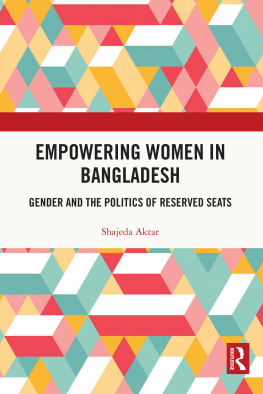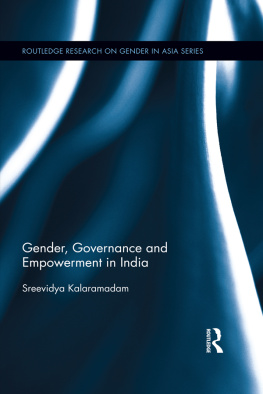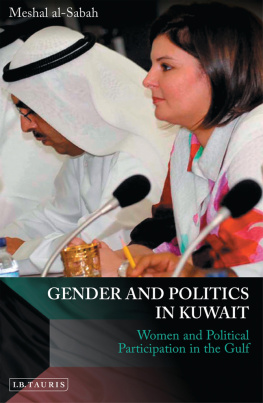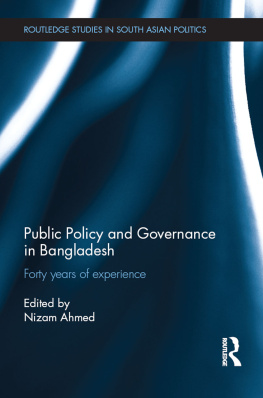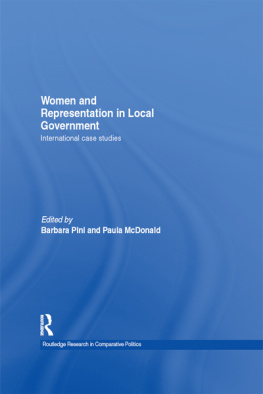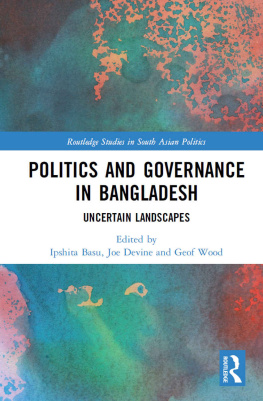Empowering Women in Bangladesh
This book investigates the deep linkages between gender and grassroots politics. It studies how women candidates in Bangladesh are elected in reserved seats in the local government bodies and explores the challenges that they face both from within the domestic unit and from the government administration.
The book focuses on grassroots-level governance and provides a comparative study between selected rural and urban local government institutions in different socio-economic, educational, and cultural contexts. It documents loopholes in the system of quota seats for women, allocation of electoral constituency, and elected representatives rights and responsibilities. It also studies the life-changing impact of women at different levels of governance and society and offers important policy implications for furthering their participation and empowerment.
A major intervention in the study of Bangladesh and its politics, this key text will be of great interest to scholars and researchers of political science, public administration, gender studies, public policy, and South Asian studies.
Shajeda Aktar is Chairperson at the Department of Public Administration, University of Rajshahi, Bangladesh. She has 18 years of research and teaching experience at the university level. Her research interests include public policy, electoral representation, women empowerment, capacity building, gender mainstreaming, poverty, public health, and household dynamics. She has published numerous papers in reputed journals, edited books, and presented her works in conferences at home and abroad. She is skilled in managing team-based research projects, keen to share knowledge and promote open discussions. She obtained her PhD from Flinders University (Australia) with the prestigious award of Vice-Chancellors Gold Medal for Excellence in PhD thesis, and Honours and Masters from University of Rajshahi.
First published 2022
by Routledge
2 Park Square, Milton Park, Abingdon, Oxon OX14 4RN
and by Routledge
605 Third Avenue, New York, NY 10158
Routledge is an imprint of the Taylor & Francis Group, an informa business
2022 Shajeda Aktar
The right of Shajeda Aktar to be identified as author of this work has been asserted by her in accordance with sections 77 and 78 of the Copyright, Designs and Patents Act 1988.
All rights reserved. No part of this book may be reprinted or reproduced or utilised in any form or by any electronic, mechanical, or other means, now known or hereafter invented, including photocopying and recording, or in any information storage or retrieval system, without permission in writing from the publishers.
Trademark notice: Product or corporate names may be trademarks or registered trademarks, and are used only for identification and explanation without intent to infringe.
British Library Cataloguing-in-Publication Data
A catalogue record for this book is available from the British Library
Library of Congress Cataloging-in-Publication Data
A catalog record has been requested for this book
ISBN: 978-0-367-48181-0 (hbk)
ISBN: 978-0-367-50392-5 (pbk)
ISBN: 978-1-003-04978-4 (ebk)
Typeset in Sabon
by SPi Global, India
Dedicated to my hardworking parents
(it is because of you I am here today )
This book makes a contribution through ethnographic study to investigate the way in which women candidates in Bangladesh are elected and the challenges that they face in striving to empower women through electoral representation. The study focuses on the grass-roots local government, in a comparative study between selected rural and urban local government institutions in different socio-economic, educational, and cultural contexts. Despite the achievements in terms of being elected and representing the needs of women, the elected representatives continue to face many challenges, and face pressures within the domestic unit and from the local government administration, which remains weighted in the favour of male candidates. Nevertheless, it uncovers how women make a contribution to changing the life chances of women through Local Government Ordinance 1997 with the provision of direct election in reserved seats. The book explores the dynamics, challenges, and the potential for womens empowerment through direct election in the reserved seats across rural and urban government institutions in Bangladesh.
Despite challenges, the findings of the book reveal some indications of womens agency and empowerment. First, the empirical findings show that the elcted women representatives in the reserved seats in the local government institutions are able to develop agency and mobility starting from the decision to stand as candidates and to contest an election, continuing through the election campaign and then by performing roles in the LGIs. Women representatives show personal freedom as a result of being able to talk to people beyond their immediate and extended family, to attend meetings with unknown officials and by visiting public places.
Second, the book documents evidences of structural changes towards gender equityas a result of the election in the reserved seats for women. The burden of domestic chores of many of the women representatives were eased after being elected. They were also more highly valued in the society and invited to community forums like school committees and to participate in shalish.1
Third, the findings show how direct election can enhance well-being and empowerment of women in the wider community. The elected women representatives appeared to be the very first people consulted for help by women in the community who face oppression, repression and injustice including dowry, rape, physical torture, and fatwa. Women representatives also took on projects and training programs enhancing income generating activities for general women.
The empirical findings of the book also identify some critical hurdles that put restrictions in achieving womens agency and empowerment in the local government institutions including non-cooperation from elected male representatives, lack of clear demarcation and overlapping of the constituency of the reserved seats with three general seats, non-identification of roles and responsibilities of the women representatives in the local government act, religious and socio-cultural restrictions including womens limited mobility outside home, etc. The findings of the book, thus, offer important policy implication in the endeavour of womens empowerment of the country.
Note
Shalish is the system of informal social adjudication in Bangladesh to solve petty disputes among villagers avoiding costly legal enforcement.
The book has benefitted from many at various capacities. The book is based on my PhD work at Flinders University, Australia. I have received tremendous motivation from my supervisors, Dr Janet McIntyre and Dr Elizabeth Morrell, to complete this project in time. They had genuine interest in my research agenda and offered useful feedback and suggestions at every stage. Flinders University is a wonderful place with an excellent supportive environment. In addition to the academic staff, I am also thankful to the administrative staff at Flinders for providing excellent support and responses whenever I needed.
At Rajshahi University I have had some frequent discussions over this project with Professor Pranab Panday, Prof. Awal Hossain Mollah, Dr Shuvra Chowdhury, Dr Parvaz Azharul Huq, and Dr Marzina Begum among others who were very helpful for this study.

